#climate book
Text
One of the points of Greta Thunberg's book about the Climate, was about female land ownership, and how we need an increase of it. That actually surprised me, not that I didn't think of it before, but because it was presented as one of the solutions.
Greta actually looked at what happens to the land when women reign over it, or when women even just have access to it and are allowed to work on it, and noticed that women almost always, naturally, regenerated the land. Women will go and plant trees on their land immediately, and feed their families with the produce it makes. Women will not even stop at planting trees on their land, they'll go and re-forest the surrounding areas too, sharing secrets of the trees with others who can benefit from the extra free food. Women will plant native species, bushes, flowers, gardens, revitalize the soil, add life to the dirt and the sand, and this is something that is recorded consistently and long term with the female land ownership, land is not only regenerated, but used for immediate benefit of all life on it. That includes humans, animals, bugs, bacteria, plants and the local environment in general.
Greta also points out that most of the land that women are working on, is currently not their own. They're most often lending their hands to the land owned by their husbands, brothers, uncles, relatives or landlords, and these m*n will sometimes decide to undo all that work, and build something environmentally destructive on it in order to make a personal profit.
This is why Greta implores that is important that women own more land, personally and with full power over what happens to it. Women having full control over land is nature's way of regeneration and prevention of climate change. Give land to the women to fight climate change.
3K notes
·
View notes
Text
This Is The Best Book I’ve Ever Read to Empower Anyone with Real Climate Hope
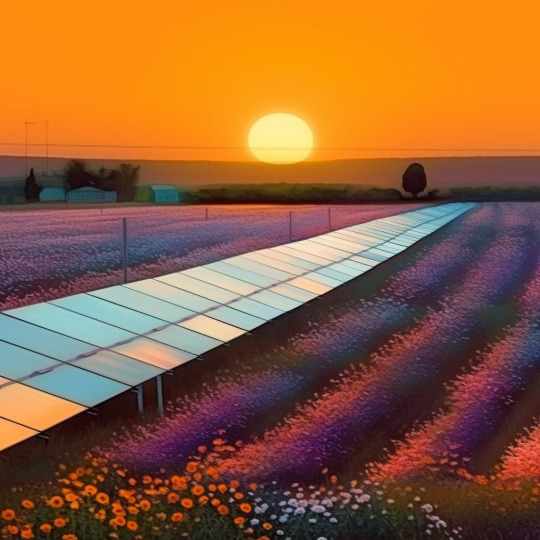
READ MY REVIEW👉 Not Too Late: Changing the Climate Story from Despair to Hope
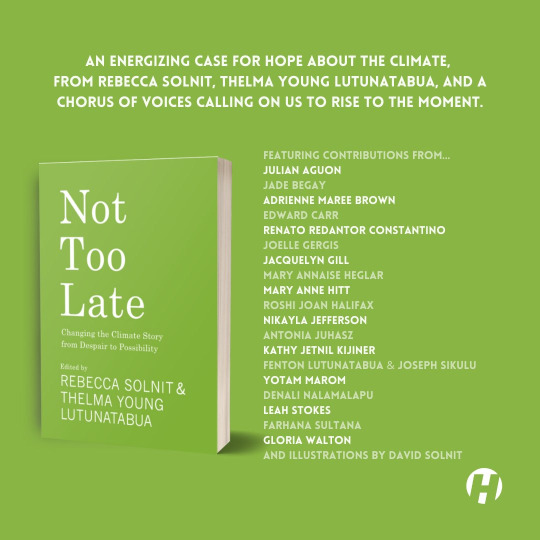
"To hope is to accept despair as an emotion but not as an analysis. To recognize that what is unlikely is possible, just as what is likely is not inevitable."
—Rebecca Solnit
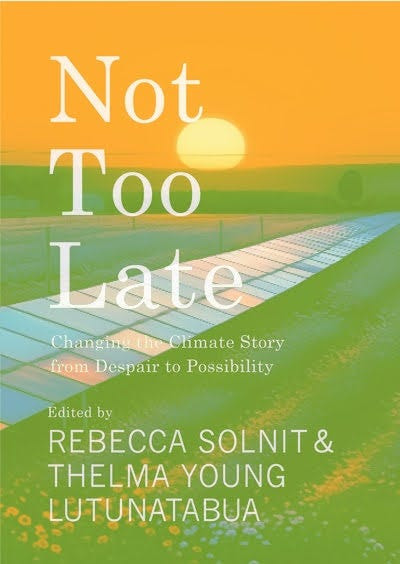
What gives me hope is that human history is full of examples of people across the ages who have risen to face the great challenges of their time and have succeeded. Victory is not the arrival in some promised land; it is the series of imperfect victories along the way that edge us closer to building the critical mass that eventually shifts the status quo.” —Rebecca Solnit
Not Too Late: Changing the Climate Story from Despair to Hope
#climate hope#climate#climate change#climate art#climate optimism#climate action#climate justice#climate book#book review#book recommendations#environment#earth month#book#books#rebecca solnit#renewable energy#renewable power#courage#climate solutions#favorite quotes#quotes#inspiration#inspiring quotes#envrionment#environmental communication#climate communication#favorite books#despair#possibility#climate story
38 notes
·
View notes
Text

#Trans women#politics#books#news#climate change#lbgtq#gun violence#democrats#capitalism#lunch school
5K notes
·
View notes
Text
Solarpunk Sunday Suggestion:
Get a library card
#solarpunk#hopepunk#environmentalism#cottagepunk#social justice#community#optimism#bright future#climate justice#tidalpunk#local amenities#books#library economy#solarpunksundays
967 notes
·
View notes
Text
me sending yet another email to a French public service to ask them why they use so many gratuitous English words in a service that's supposed to be non-discriminatory and accessible to everyone in the country

#this time it's about the paris library network which offers new book suggestions every month#and so many of the category titles are in english..... why? all the books are in french#'cosy mystery' 'space opera' 'road trips' 'climate fiction' < all of these were in english#i don't care how widespread some of these phrases are; you are public libraries and the public speaks french#do you really want to discourage people who don't read in english from clicking the links to check out the books?#why are you doing this. i am throwing virtual tomatoes at you#a lot of older people are confused or intimidated by this deluge of english loanwords. fuck them i guess?#and yes i picked napoléon in waterloo because i know this is a losing battle#même à la fnac on voit des intitulés de rayon en anglais alors que le rayon ne contient que des livres français...
555 notes
·
View notes
Text
Andy Weir is so so good at making a HUGE impact when a character cries or breaks down. The rest of the novels are usually pretty light hearted and suddenly BAM. TEARS. and it just really gets me. It suddenly reminds me of the massive impact those kinds of situations would actually have because these people are HUMAN. The reality of what they are going through. Amazing 10/10
#they’re crying and then I’m crying and there’s tears on the book-#the scene with the climate science guy in phm? With the nukes? that fucking got me so hard#you just know that if a character cries in an andy weir book it’s gonna be written so well and you’re going to be crying too#project hail mary#andy weir#the martian#phm#ryland grace#artemis book#books#writing#not art
596 notes
·
View notes
Text
Naomi Klein's "Doppelganger"
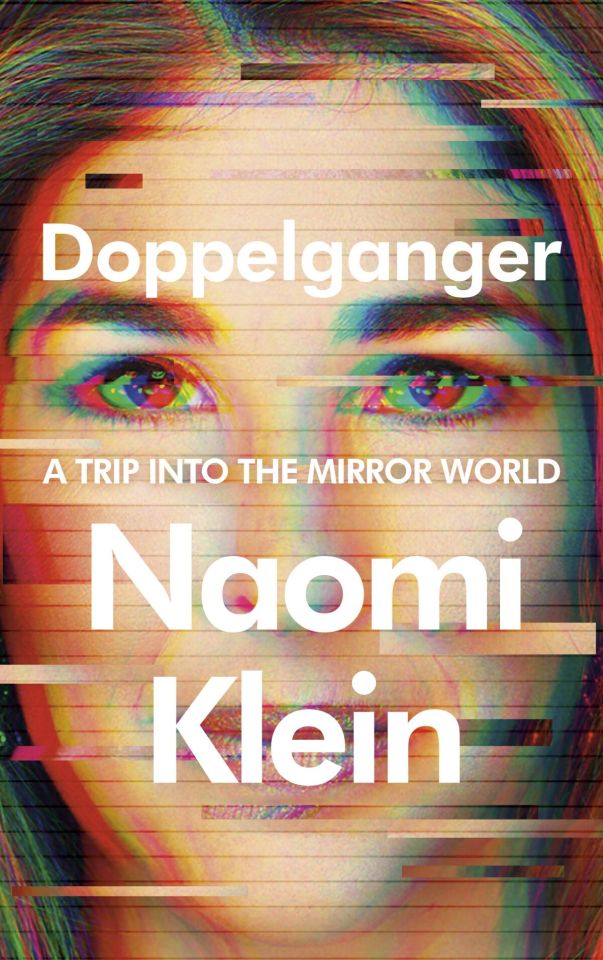
Tomorrow (September 6) at 7pm, I'll be hosting Naomi Klein at the LA Public Library for the launch of Doppelganger.
On September 12 at 7pm, I'll be at Toronto's Another Story Bookshop with my new book The Internet Con: How to Seize the Means of Computation.

If the Naomi be Klein
you’re doing just fine
If the Naomi be Wolf
Oh, buddy. Ooooof.
I learned this rhyme in Doppelganger, Naomi Klein's indescribable semi-memoir that is (more or less) about the way that people confuse her with Naomi Wolf, and how that fact has taken on a new urgency as Wolf descended into conspiratorial politics, becoming a far-right darling and frequent Steve Bannon guest:
https://us.macmillan.com/books/9780374610326/doppelganger
This is a very odd book. It is also a very, very good book. The premise – exploring the two Naomis' divergence – is a surprisingly sturdy scaffold for an ambitious, wide-ranging exploration of this very frightening moment of polycrisis and systemic failure:
https://www.youtube.com/watch?v=lCjcwVhFhTA
Wolf once had a cluster of superficial political and personal similarities to Klein: a feminist author of real literary ability, a Jewish woman, and, of course, a Naomi. Klein grew accustomed to being mistaken for Wolf, but never fully comfortable. Wolf's politics were always more Sheryl Sandberg than bell hooks (or Emma Goldman). While Klein talked about capitalism and class and solidarity, Wolf wanted to "empower" individual women to thrive in a market system that would always produce millions of losers for every winner.
Fundamentally: Klein is a leftist, Wolf was a liberal. The classic leftist distinction goes: leftists want to abolish a system where 150 white men run the world; liberals want to replace half of those 150 with women, queers and people of color.
The past forty years have seen the rise and rise of a right wing politics that started out extreme (think of Reagan and Thatcher's support for Pinochet's death-squads) and only got worse. Liberals and leftists forged an uneasy alliance, with liberals in the lead (literally, in Canada, where today, Justin Trudeau's Liberal Party governs in partnership with the nominally left NDP).
But whenever real leftist transformation was possible, liberals threw in with conservatives: think of the smearing and defenestration of Corbyn by Labour's right, or of the LibDems coalition with David Cameron's Tories, or of the Democrats' dirty tricks to keep Bernie from appearing on the national ballot.
Lacking any kind of transformational agenda, the liberal answer to capitalism's problems always comes down to minor tweaks ("making sure half of our rulers are women, queers and people of color") rather than meaningful, structural shifts. This leaves liberals in the increasingly absurd position of defending the indefensible: insisting that the FDA shouldn't be questioned despite its ghastly failures during the opioid epidemic; claiming that the voting machine companies whose defective products have been the source of increasingly urgent technical criticism are without flaw; embracing the "intelligence community" as the guardians of the best version of America; cheerleading for deindustrialization while telling the workers it harmed with "learn to code"; demanding more intervention in speech by our monopolistic tech companies; and so on.
It's not like leftists ever stopped talking about the importance of transformation and not just reform. But as the junior partners in the progressive coalition, leftists have been drowned out by liberal reformers. In most of the world, if you are worried about falling wages, corporate capture of government, and scientific failures due to weak regulators, the "progressive" answer was to tell you it was all in your head, that you were an unhinged conspiratorialist:
https://doctorow.medium.com/the-swivel-eyed-loons-have-a-point-3434d7cbfae2
For Klein, it's this failure that the faux-populist right has exploited, redirecting legitimate anger and fear into racist, xenophobic, homophobic, sexist and transphobic rage. The deep-pocketed backers of the conservative movement didn't just find a method to get turkeys to vote for Christmas – progressives created the conditions that made that method possible.
If progressives answer pregnant peoples' concerns about vaccine risks – concerns rooted in the absolute failure of prenatal care – with dismissals, while conservatives accept those concerns and funnel them into conspiratorialism, then progressives' message becomes, "We are the movement of keeping things as they are," while conservatives become the movement of "things have to change." Think here of the 2016 liberal slogan, "America was already great," as an answer to the faux-populist rallying cry, "Make America great again."
When liberals get to define what it means to be "progressive," the fundamental, systemic critique is swept away. Conservatives – conservatives! – get to claim the revolutionary mantle, to insist that they alone are interested in root-and-branch transformation of society.
Like the two Naomis, conservatives and progressives become warped mirrors of one another. The progressive campaign for bodily autonomy is co-opted to be the foundation of the anti-vax movement. This is the mirror world, where concerns about real children – in border detention, or living in poverty in America – are reflected back as warped fever-swamp hallucinations about kids in imaginary pizza restaurant basements and Hollywood blood sacrifice rituals. The mirror world replaces RBG with Amy Coney-Barrett and calls it a victory for women. The mirror world defends workers by stoking xenophobic fears about immigrants.
But progressives let it happen. Progressives cede anti-surveillance to conservatives, defending reverse warrants when they're used to enumerate Jan 6 insurrectionists (nevermind that these warrants are mostly used to round up BLM demonstrators). Progressives cede suspicion of large corporations to conservatives, defending giant, exploitative, monopolistic corporations so long as they arouse conservative ire with some performative DEI key-jingling. Progressives defend the CIA and FBI when they're wrongfooting Trump, and voting machine vendors when they're turned into props for the Big Lie.
These issues are transformed in the mirror world: from grave concerns about real things, into unhinged conspiracies about imaginary things. Urgent environmental concerns are turned into a pretense to ban offshore wind turbines ("to protect the birds"). Worry about gender equality is transformed into seminars about women's representation in US drone-killing squads.
For Klein, the transformation of Wolf from liberal icon – Democratic Party consultant and Lean-In-type feminist icon – to rifle-toting Trumpling with a regular spot on the Steve Bannon Power Hour is an entrypoint to understanding the mirror world. How did so many hippie-granola yoga types turn into vicious eugenicists whose answer to "wear a mask to protect the immunocompromised" is "they should die"?
The PastelQ phenomenon – the holistic medicine and "clean eating" to QAnon pipeline – recalls the Nazi obsession with physical fitness, outdoor activities and "natural" living. The neoliberal transformation of health from a collective endeavor – dependent on environmental regulation, sanitation, and public medicine – into a private one, built entirely on "personal choices," leads inexorably to eugenics.
Once you start looking for the mirror world, you see it everywhere. AI chatbots are mirrors of experts, only instead of giving you informed opinions, they plagiarize sentence-fragments into statistically plausible paragraphs. Brands are the mirror-world version of quality, a symbol that isn't a mark of reliability, but a mark of a mark, a sign pointing at nothing. Your own brand – something we're increasingly expected to have – is the mirror world image of you.
The mirror world's overwhelming motif is "I know you are, but what am I?" As in, "Oh, you're a socialist? Well, you know that 'Nazi' stands for 'National Socialist, right?" (and inevitably, this comes from someone who obsesses over the 'Great Replacement' and considers themself a 'race realist').
This isn't serious politics, but it is seriously important. "Antisemitism is the socialism of fools," its obsession with "international bankers" the mirror-world version of the real and present danger from big finance and private equity wreckers. And, as Klein discusses with great nuance and power, the antisemitism discussion is eroded from both sides: both by antisemites, and by doctrinaire Zionists who insist that any criticism of Israel is always and ever antisemetic.
As a Jew in solidarity with Palestinians, I found this section of the book especially good – thoughtful and vigorous, pulling no punches and still capturing the discomfort aroused by this deliberately poisoned debate.
This thoughtful, vigorous prose and argumentation deserves its own special callout here: Klein has produced a first-rate literary work just as much as this is a superb philosophical and political tome. In this moment where the mirror world is exploding and the real world is contracting, this is an essential read.
I'll be Klein's interlocutor tomorrow night (Sept 6) at the LA launch for Doppelganger. We'll be appearing at 7PM at the @LAPublicLibrary:
https://lafl.org/ALOUD
Livestreaming at:
https://youtube.com/live/jIoAh-jxb2k

If you'd like an essay-formatted version of this post to read or share, here's a link to it on pluralistic.net, my surveillance-free, ad-free, tracker-free blog:
https://pluralistic.net/2023/09/05/not-that-naomi/#if-the-naomi-be-klein-youre-doing-just-fine

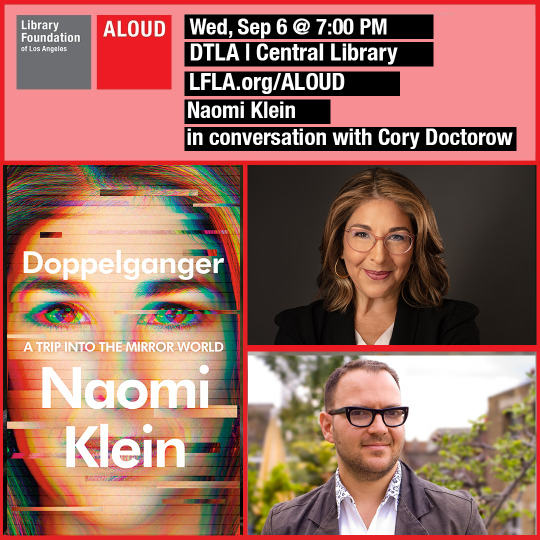
#naomi klein#naomi wolf#conspiratorialism#climate#shock doctrine#race#antisemitism#gender#feminism#books#reviews#no logo#corporatism#heel turns#realignment#power#leftism vs liberalism#gift guide#rabbit holes#memoir#israel#zionism#pluralistic
271 notes
·
View notes
Text
hbomb's blast of james somerton really makes me think back to other older youtubers who have been doing their good work, performing critical research and analyses into niche fields who then had their work plagiarized from their videos and henceforth wanted to stop making content.
yeah and also they got pushback from the internet saying the degree of plagiarism they'd experienced is a made up problem.
this is a sideways post.
#THIS IS A SIDEWAYS POST#hbomberguy#james somerton#sideways440#plagiarism#academia#youtube drama#SO IF YOU GUYS DON'T KNOW SIDEWAYS440#HE DOES VIDEO ESSAYS OF MUSIC ANALYSES FROM GENRES TO SPECIFIC SONGS TO EVEN DISNEY MUSICALS#AND I HAVE BEEN PISSED EVER SINCE I FOUND OUT WHY HE STOPPED MAKING VIDEOS#BECAUSE HE IS ONE OF THE PEOPLE WHO I ENJOY VIDEO ESSAYS FROM GRAVELY#LIKE IDW NO SHADE BUT I COULD NOT RIGHT NOW WITH THE BREADTUBE CLIMATE#I NEED SUBSTANCE ABOUT NON SOCIAL ISSUES I NEED LITERARY ANALYSES ABOUT NOT-BOOKS DESPERATELY#AND NOT-GAMES AND NOT-MOVIES I AM THAT PICKY
127 notes
·
View notes
Text
the darkling says “fine, make me your villain” because he is. what’s not clicking
#shadow and bone#grishaverse#sab#aleksander morozova#the darkling#pro darkling#sab meta#‘he acts like he isn’t the villain’ like yeah I guess if you want to examine it without any deeper analysis#when the statement itself is actually fascinating to put into a narrative context and analyze the means by which certain steadfast roles#are enacted throughout the books#and the larger implications of character want/desire and leading goal vs world state and perceived morality#largely due to prejudice and war time sentiments#as well as the individual harm caused and the way it’s significance becomes questionable when placed in stark contrast#to the broader political and socioeconomic climate#which doesn’t even take into consideration individual character roles and the doylist analysis of their relative functions as ideas#instead of entire personalities with depth#when you give an idealistic character a goal larger than life with a tactical relevance over a moral one#within a story that also centers around a broader goal of ‘saving the world’ as well as personal trauma#and attempt to liken both to the same moral equivalence and significance#then try to pit them against each other#especially when your narratively condemned villain desires more than anything to protect the masses and be loved for it#showing a fascinating level of genre unawareness. yet displaying a relative awareness to the role he has been unwillingly cast as#because he is both at odds with the genre but not with the general moral tone of the story and it's discordant messages#that rely on the pov of a character that fundamentally cannot understand him#because of his place in the story#and cannot understand the world state#because of her place in the story#you are going to get statements like this#sure yes. he ‘says it like he isn’t the villain’#but come on. we can do better
233 notes
·
View notes
Text
I've been reading 'The Climate Book' from Greta Thunberg, and I have to talk about it. I've never seen a book written so brilliantly and desperately, pleading for awareness, for action, for survival. I thought I was aware of the climate change, but there was a vast amount of information I did not know. I'll start from the ones I did.
I knew that the climate has already changed, and will continue to change until a lot of animal species will go extinct, and a big amount of human beings will suffer, end up impoverish, misplaced, in starvation, or dead. I knew the culprits were the companies that refused to stop taking down forests, burning fossil fuels, promoting lifestyles of consumerism, over-consumption, generated the amount of waste that the planet could not safely consume or store. I also knew that one of the biggest pollutants were big oil, animal and plant agriculture, fast fashion industry, travel industry, and the capitalistic system that enabled 1% of humanity to own and over-consume 90% of the resources available to us. Knowing this made me feel powerless, because even as I boycott all of it, I can't do much else, and I'm not enough to stop what is going on. I am merely a drop in the ocean - which is what Greta points out as well. But, Greta doesn't think we're powerless.
This book is incredible in the sense that it goes over and beyond to think practically. It doesn't despair, it doesn't panic, it doesn't think any other way but how to practically and effectively bring change, what are the options and possibilities, what is true and what is propaganda, how to avoid millions of deaths and extinctions that are sure to come, if we do nothing. Greta has analyzed all action that is 'being done', and found out most of it was fraud, cheating, lying. All of the governments and companies who were bragging about reduced emissions, or offsetting emissions, have simply found ways to outsource them and to emit them in another, poorer country. The amount of emissions has actually increased.
She has also interviewed the world leaders, and people responsible and suffering from climate change - and these are the results: Nobody feels responsible, nobody feels as if it's their turn to change, to reduce, to do anything to help it. Even interviewing people whose livelihood was taken away from them due to climate change, who have lost their living environments already, their trees and animals and fields and fertility and soil, when asked if they would be willing to work ecologically from now on, with reduced or low emissions, their answer was 'Why should we? It's not fair, they took from us and enjoyed, while we suffered. We won't stop until we have what they have. We deserve it.'
With this information, Greta has found a truth of how humans influence each other - we imitate. If we see someone else doing something, or having something we find desirable, we also want it. We look at ourselves in relation to other people that surround us, we take responsibility according to what others around do, and we hold ourselves accountable only as much as others do. And this is why we have a power that goes beyond individual action, beyond simply lowering our own emissions and boycotting companies that are responsible for pollution - we are able to influence others. We're able to influence the media, which forms public opinions, and using the media, force into action those who benefit from polluting the planet.
What I didn't know, and this book taught me, was that from the times humans started to hunt, they didn't only have a great effect on the environment, they were the absolute leading agent on it. Soon after hunting the megafauna into extinction, the environment started to change not just because we affected it, but because we directed it to. We caused the extinction of many species throughout the past, by hunting, taking wild spaces for our own use, polluting water sources, changing the climate, spreading predatory species, like cats and rats, and we didn't stop there. We changed the landscapes of forests and fields, into human-used agricultural land that was effectively deadened for the purpose of wildlife. We domesticated, and then farmed animals, to such extreme degree, that right now what is left of the wildlife, is mere 12-15% of all animals out there. More than 80% of current animals by weight living on earth, are put there by animal agriculture, meant for human consumption. That is absolutely insane. We did the same with the wildlife environment as well – there is now only 3% of the forests on earth, that are still considered intact. We changed the landscape, not only slightly, but by erasing most of it, making it unusable to animals, insects or wild plants, appropriated only for agriculture, grazing, and human-only environments. And, we dug up and released so much carbon into the air, it is coming close to the amount that we had on the earth, at the time of dinosaur extinction, which wiped out a third of the planet's species. And we keep doing it, even knowing what will happen, knowing that every single time this happened in the past, it created mass extinction.
I wasn't aware how serious and extreme the changes we made were. Knowing what is going out, makes it very clear why we have a crisis, it would be crazy to expect not to have one. These changes were not reported, nobody was asked to approve of them, there were no regulations or limits, no environmental studies on consequences, and it keeps going. We keep increasing the demand for agriculture and animal products, increasing our consumption even though we are running out of the natural resources used to create the products. And it is not our fault. Most of the food and meat created by destroying this land, will go to waste, for the profit of the corporations. The world will keep living in starvation, despite so much of natural life getting destroyed for food, despite the climate crisis being caused, partly by our food production.
This doesn't mean we can't sustainably feed ourselves anymore, it just means we can't do it the way we're used to. It just tells us we need to use more resilient and less land and water consuming food. Plant based diets demand less soil and emit less carbon, gardening reduces the amount of agricultural space needed to feed us, supporting and protecting wildlife wherever it's still thriving, will save both soil, animal species, and biodiversity that is very quickly fading from the planet.
I've also learned that even as we're close to the tipping point, but haven't reached it yet. Whatever we do right now that stops us from reaching it, will mean the difference between life and death to the future generations of people, animals, and plants. If we manage to make changes now, to stop the ice from melting past the tipping point, we can save millions of lives, that would end in certain death otherwise. If we can create policies that are not volountary but binding, we have a chance to save livable land, animal and plant species, biodiversity, and human quality of life. It's not too late to act, in fact, this is the vital time to act, and we're the only ones who can do it.
And the way you can act is not just by reducing waste, reducing the amount of energy you consume, reducing animal-products in your food and refusing to waste and throw away usable goods, but by being public about it. By making it clear it's a positive improvement on your life, on your quality of life, that it's both moral and enjoyable, both inspiring and encouraging others to do the same. Some of us have bigger impact on others than we might know, and if we start doing it and visibly enjoying it, there are others who will follow.
This book has taught me immense amount of science behind the climate crisis, and gave me incentive to do more than just live and feel helpless, I need to do more. I recommend this book to anyone wanting to learn more, and wanting to act more. I will be from now on, writing more about ecology and preserving the planet, and how to do it. If we're the directors of where this planet is going, we have to be so intentionally, with knowledge, wisdom and awareness of what we are doing. We can do good, and humans have been doing good, any time there's been wisdom, awareness and intention in how we're shaping the environment. And if anyone wants the book in the audio form, send me a message and I will give it to you.
#Greta Thunberg#The Climate Book#book review#climate crisis#climate change#global warming#actions to stop global warming#impacting others to understand and prevent the worst of the worst#carbon emissions#lying politicians
598 notes
·
View notes
Text
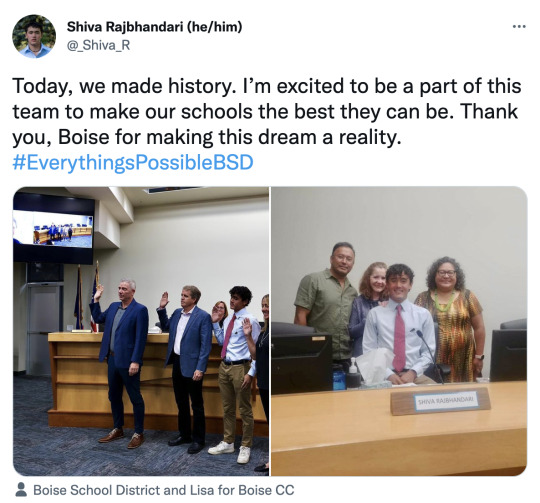
Oh look, another student crushing the competition to help support LGBTQ+ kids on their school board.
You simply love to see it. :')
#itgetsbetter#queer youth#lgbtq youth#queer kids#book banning#school board#vote#student leader#student activist#climate activism
1K notes
·
View notes
Text

#climate change#climate crisis#indiana jones#democrats#republicans#politics#woc#books#scotus#us supreme court
1K notes
·
View notes
Text
Just finished a book I wanted to share cause I think some fellow Solarpunks might like.
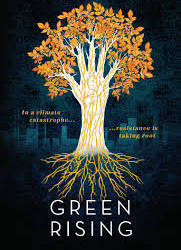
Green Rising by Lauren James is set in the modern world where people aged between 9 and 20 have suddenly developed the power to grow plants, and are such named "Greenfingers"
It follows three different teenagers with such powers.
Gabrielle Ventura, climate activist, anarchist, leader of Climate Rebellion and the first person to develop the powers in the middle of a protest.
She uses this publicity to help spread information about climate change and ways to combat it and proclaims the powers must of been given to them specifically to fight climate change.
Hester Daleport, daughter of the owner of Daleport industries who's main export is oil.
She starts a team of greenfingers as a cover up when her own powers act up in a meeting but throughout the book she learns the real impact of what her fathers company is doing and Fights to stop it.
Theo Carthew, son of a fisherman in England who was already struggling, then looses all income when their boat is crashed by an unmarked Daleport rig.
Theo takes a job as one of Hesters greenfingers to keep his family afloat and is the main person to help expose her to the companies impact.
While it doesn't speak on every important topic relating to this it does touch on the consequences of trying to help when being informed and causing more harm.
And how big risky actions could have no or even negative impact.
(Highly reccomend this post by @thefloralmenace for more information on that)
TW for Body horror (plants growing in and over bodies) but I think that's the only one.
72 notes
·
View notes
Text
Hey, yanno how Climate Change is a real thing that is tangibly, at this moment, affecting our world?
Well it turns out, the wealthy and their investment firms have been seeing the mounting evidence that oil companies have had for decades and are slowly starting to think more long-term about their portfolios in the face of rising sea levels, more extreme weather, and the myriad of ways climate crises are affecting...well. Everything. Maybe this means they invest more into sustainability, green energy, building more resilient infrastructure, or carbon offsets. Some of it, of course, is simple corporate greenwashing, but there are those that are taking this trend and packaging it into something called ESG (Environmental, Social, and corporate Governance).
Now some people would say this is predictable, even sensible. Just the good ol’ Free Market(tm) rationally responding to market forces and a changing world.
But those people would be fools! Insidious fools! For conservative sorcerers have come out with a new cursed phrase to explain this new market trend: Woke Investing.
What makes this investing “woke?” Well, much like how conservatives normally flounder when trying to define a word they stole from black people, “Woke Investing” essentially just means any kind of capital investment that they, the fossil fuel billionaire class and their sycophants, don’t personally profit from.
One of these aforementioned sycophants is Andy Puzder, conservative commentator, fellow at The Heritage Foundation, and former fast-food CEO. He calls this kind of so-called woke investing “socialism in sheep’s clothing,” further explaining in leaked audio of a closed-door meeting:
“My father's generation's challenge was the Nazis, who, by the way, were, of course, very proud socialists[citation fucking needed]. The challenge of my generation was the communists, who were, of course, very committed socialists. The challenge of your generation is ESG investing, and it's more insidious than communism or the Nazis.”(source)
You heard it here first, folks. Not investing as much in fossil fuels is more insidious than the Third Fucking Reich.
As usual, the Heritage Foundation is putting their petro-chemical donor’s money where their mouth is. Bills are being proposed to blacklist banks that don’t invest in key state industries, such as West Virginia coal or Texas oil. Fourteen states have already passed bills to restrict ESG-type investing, with Florida Governor Ron “Bullies Kids for Wearing Masks” Desantis leading the charge.
In other words, Climate Denial has reached such a point that so-called Free Market Conservatives who claim to hate big government are trying to make it illegal for banks, investment firms, and financial institutions to make any financial decisions that acknowledges Climate Change is real.
#of course ESG has also been used to describe any kind of internal corporate action#to increase diversity in the work place or implementing new anti-discrimination policies#(which are usually more performative than actually meaningful but that's a separate issue)#a Republican Presidential candidate#Vivek Ramaswamy#has even made ESG investing his personal bugbear#writing such books as 'Woke Inc' and warning of socially conscious investors ''forcing'' companies they invest in#to devote resources to environmental and social policies that are anathema to the right#which is just...a brand new invented crisis by a political movement#in constant need of a crisis to rally their base and justify for draconian legal controls#to favor certain industries and undercut their competition#all under the guise of red scare-type moral and economic panic#ESG#Woke Politics#Climate Change#Capitalism#Republicans#Investment
112 notes
·
View notes
Text
In this episode we explore a relatively new subgenre of science fiction called Solarpunk, which aims to imagine better, more ecologically harmonious, futures on earth. In many ways Solarpunk is a reaction to both the real-world climate crisis and to the many apocalyptic visions of collapse filling our screens. Andrew Sage from the YouTube channel Andrewism joins host Jonathan McIntosh and friend of the show Carl Williams for this conversation.
References & Links
• The Andrewism YouTube Channel
• Walkaway by Cory Doctorow
• Ecotopia by Ernest Callenbach
• Sunvault: Stories of Solarpunk and Eco-Speculation
• Fighting for the Future edited by Phoebe Wagner
• Parable of the Sower by Octavia Butler
• Princess Mononoke from Studio Ghibli
• The Ones Who Walk Away from Omelas by Ursula K. Le Guin
• Emergency Skin by N. K. Jemisin
• Monk and Robot book series by Becky Chambers
• Dear Alice from THE LINE
• Dear Alice’ Decommodified Edition by Waffle To The Left
• Our History Is the Future by Nick Estes
• 3000-Year-Old Solutions to Modern Problems by Lyla June
• Capitalist Realism by Mark Fisher
#Solarpunk and How We Escape Dystopia#pop culture detective#pop culture#solarpunk#solar punk#podcast#podcasts#cultural criticism#cultural critique#movies#film#tv#books#literature#corporate media#climate crisis#environmental activism#activism#collective action#water protectors#land back
205 notes
·
View notes


